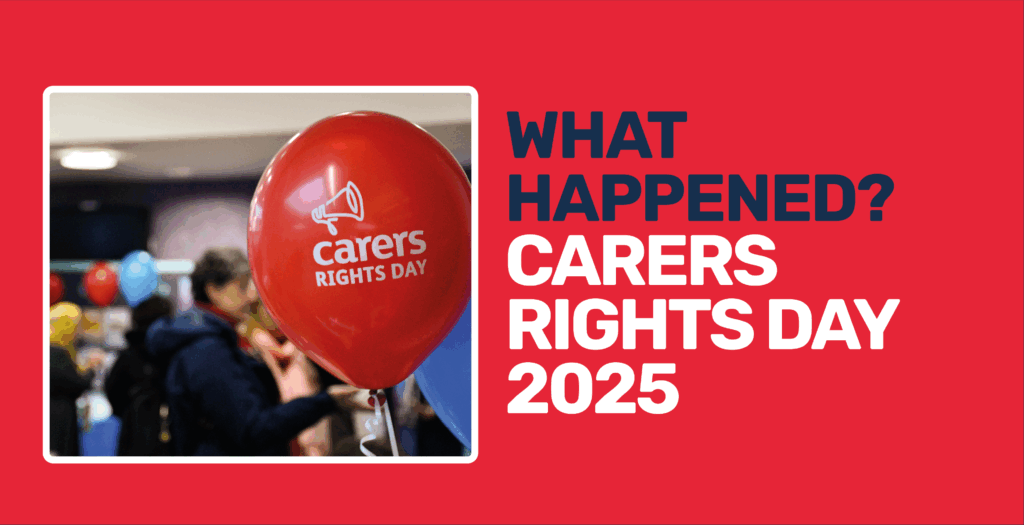What Is Carers Rights Day?
Carers Rights Day takes place nationally on Thursday 20th November. This important day aims to highlight the vital role unpaid carers play in our society and to ensure they are aware of their legal entitlements and the support available to them.
Every day, a staggering 12,000 people become unpaid carers, often without realising the full implications of their new role. Many carers are unaware of their legal rights and the support they are entitled to, including benefits and services. This year’s theme aims to help carers understand their rights and empower them to access the support they need.
Knowing your rights as a carer is crucial. It provides you with the information you need to feel confident asking for the support you deserve and to challenge situations where your rights are not being met. Whether it’s in the workplace, education, accessing healthcare, or interacting with professionals, understanding your rights gives you the power to advocate for yourself and ensure you receive the necessary support.
There are approximately between 20,000 and 27,000 unpaid carers living in Solihull, making up just over 9% of the local population, which is above the England average. Click here to learn more via Solihull Carers’ Strategy.
About 70% of carers say they have a long-term physical or mental health condition, disability, or illness, compared to 59% of non-carers. Click here to learn more via Solihull Carers’ Strategy.
Carers Trust Solihull supports over 5,000 carers each year, including 780 young carers and 1,029 parent carers. Click here to learn more via Carers Trust Solihull.
Many carers in Solihull delay identifying themselves or seeking help. Early support is essential to prevent crisis and improve carers’ overall wellbeing. Click here to learn more via Carers Trust Solihull.
Our Plans
In previous years, our Carers Rights Day events have centred around a single event. A panel of local organisations and charities, offering their advice and support through questions and answers, as well as information stalls offering advice and guidance.
For 2025 we will be holding TWO events, one each in the north and south of Solihull. We are hoping this will mean as many of you as possible will be able to come along, have your questions answered, find new support, and of course, learn about your ‘Carers Rights’.
We have selected a range of guests to be at our events who cover a wide range of topics and concerns that greatly affect unpaid carers. From financial and legal, to benefits and health, should you have any worries or require support then you will find the help you need.
Refreshments will be provided.
Parking for the North Solihull event is free for up to 3 hours at Asda car park and Chelmsley Wood Car Park. Should you need to pay for parking anywhere else, we will cover costs of up to 3 hours of parking.
Parking at the South Solihull Event will be reimbursed to you. We will cover costs of up to 3 hours of parking.
In order to be reimbursed for parking, you will need to be registered with Carers Trust Solihull. It is not essential but please bring your Carers ID card to speed up the reimbursement process. If you need a new Carer’s ID card then please get in contact with us by clicking here.
North Solihull Event
Wednesday 19th November
10.30AM ̶ 12.30PM
10 West Mall
Chelmsley Wood Library
Chelmsley Wood Shopping Centre
B37 5TN
View On Map
The library is on the second floor, there is lift access to that floor, and escalator access to the first floor then stairs.
There is free parking for up to 3 hours in the Asda car park, and also in the Chelmsley Wood Shopping Centre.
Bus routes: 71, 72, X12, X13, 14, 97, 891, 94, 94A, 95, 96
South Solihull Event
Thursday 20th November
12.00PM ̶ 2.30PM
The Core
Homer Road
South Solihull
B91 3RG
View On Map
The Library is next to the Touchwood Shopping Centre, and is on Theatre Square. The nearest car parks are Touchwood and Church Hill.
Bus stops in Solihull are on Poplar Road as well as Solihull Station Interchange, which is near Solihull Railway station.
Bus routes: 1S, 4, 4A, 5, 6, 27, 49, 72, 73, 76, 82, 87, 188, 223, 233, 513, 514, 519, 601, 602, 630, 631, 664, 665, A6, A7, A8, A9, A10, X2, X12, X20
Who Will Be There?
Solihull Council provides support for unpaid carers of all ages within the borough, working in partnership with organisations like Carers Trust Solihull to ensure carers can access advice, emotional support, and practical help. The Council commissions carers assessments, develops personalised support plans, and offers guidance on benefits, wellbeing, and emergency help. Direct payments or grants may be available to enable carers to take breaks or look after their own wellbeing, and staff are always on hand to signpost further services and information.
Offers unpaid carers practical and emotional support including carer support groups, respite services, and trusted advice on caring, benefits, and arranging help at home.
Listens to unpaid carers and local people about health and social care services, shares feedback with decision-makers, and offers free advice and signposting to help you find care or raise concerns.
An independent forum of parent carers working to improve outcomes for children and young people (0-25) with SEND in Solihull. They amplify parent carer voices, share experiences with service providers, and help shape positive change for families across the borough.
Solihull College & University Centre delivers high-quality education and training across further, higher, and adult levels, supporting learners from all backgrounds to achieve their goals. With specialist facilities and expert tutors, the college offers a wide curriculum – including apprenticeships, technical programmes, university degrees, and professional courses – in partnership with leading universities and sector employers. Students benefit from personalised academic and wellbeing support, careers guidance, inclusive learning environments, and a culture that is caring, purposeful, and professional, empowering individuals to succeed in their chosen careers and thrive in education.
Providers of award-winning legal services in Solihull, covering family law, conveyancing, wills and probate, employment, immigration, and more. Their expert team supports individuals and businesses with clear advice and compassionate service, helping you resolve legal matters confidently.
Specialists in NHS funded care, complex case management, and patient flow solutions. They work with the NHS and social care partners to ensure efficient, high-quality care assessments, reviews, and support for individuals needing continuing healthcare, helping patients and carers navigate complex health and funding systems.






Your Rights
Unpaid carers face unique challenges—financial pressures, practical struggles, and emotional demands are all part of the caring journey. Nearly two-thirds of carers report being worried about covering basic living costs or managing in the future, with many cutting back on essentials like food and heating. Knowing where to turn, and understanding one’s rights, is essential.
Here, we have created a simple to use and easy to understand tool for you to see what rights you have as an unpaid carer; how you can be helped and supported. Just click the topic on the right to see more information.
We have also created “Your Guide to Carer’s Rights“, a more in-depth and thorough resource, to help breakdown the complications and confusion, and it works great as a companion piece with this page. Click the button below to read Your Guide to Carer’s Rights.
Financial
If you would like more in-depth explanation of the below information, you can read our guide to Carer’s Financial Support by clicking here.
Carer's Allowance
A benefit for individuals who provide at least 35 hours a week of care to someone on disability benefits. It’s not means-tested but can impact other benefits. Only one carer can claim per person cared for, and recipients receive National Insurance credits.
Click here to read Carer’s Essentials ‘Guide to Carer’s Allowance”.
Carer's Credit
A National Insurance credit to fill gaps in contribution records for carers providing 20+ hours of care per week (but less than 35), protecting future State Pension. It is not a payment and isn’t means-tested.
Click here to read more about Carer’s Credit with “Your Guide to Carer’s Financial Support”
Attendance Allowance
For individuals over State Pension age needing help due to disability or health conditions. It provides extra money (at two possible rates) depending on care needs and is not means-tested.
Click here to read more about Attendance Allowance with “Your Guide to Carer’s Financial Support”
Personal Independence Payment (PIP)
Supports people aged 16+ with long-term health conditions by covering extra daily living and mobility costs. Not means-tested. Assessed on how the condition impacts everyday life. Having a carer is not required to apply.
Click here to read more about PIP with “Your Guide to Carer’s Financial Support”
Disability Living Allowance (DLA) for Children
Financial support for children under 16 who require much more care or supervision than others their age due to disability. Award rates depend on the level of help needed and are not impacted by parents’ income or work status.
Click here to read more about DLA with “Your Guide to Carer’s Financial Support”
Energy Bill Support
Carers and those they care for can access various grants, cold weather payments, energy bill support, free safety checks, and debt funds. Charities, local schemes, and water bill reduction schemes also provide practical financial assistance.
Click here to read more about Energy Bill Support with “Your Guide to Carer’s Financial Support”
Council Tax Discounts
Unpaid carers may qualify for council tax discounts depending on their relationship and the cared-for person’s benefits. Further reductions for low-income or crisis situations exist. Notifications are important if household changes.
Click here to read more about Council Tax Discounts with “Your Guide to Carer’s Financial Support”
Legal Matters
Carer’s Assessment
All adult carers in England are entitled to a free assessment by their local council to identify needs for support, consider impact on all areas of life, and develop a personalised support plan (which may include a personal budget).
Learn more about Carer’s Assessments with Solihull Council by clicking here or using “Your Guide to Carer’s Assessments” by clicking here.
Parity of Esteem and Information Rights
The Care Act 2014 mandates that carers’ needs are valued equally to those of the people they care for. Councils must offer accessible information/advice and promote carer wellbeing, prevention, and advocacy.
Click here to read more about Parity and Information Rights with “Your Guide to Carer’s Rights”
Hospital Discharge and Complaints
Carers must be involved in planning for a loved one’s hospital discharge and have the right to complain if not properly included.
Click here to read more about Hospital Discharges and Complaints with “Your Guide to Carer’s Rights”
Power of Attorney, Wills, Probate, and Trusts
Guidance on making a Lasting Power of Attorney (LPA), writing a will, and managing estates or trusts to ensure financial and care decisions are legally protected, with support available via legal professionals and carer workshops.
Click here to read more about Power of Attorney and Wills with “Your Guide to Carer’s Rights”
Employment
Carer’s Leave
From April 2024, employees can take up to one week of unpaid leave per year for caring responsibilities, available from day one of employment and can be taken flexibly.
Click here to read more about Carer’s Leave with “Your Guide to Carer’s Rights”
Flexible Working
Carers can formally request changes to their work arrangements from the start of employment (no longer needing to wait 26 weeks). Employers must consider and consult before rejecting.
Click here to read more about Flexible Working with “Your Guide to Carer’s Rights” or read more here with “Your Guide to Carer’s Rights at Work”
Attendance Allowance
For individuals over State Pension age needing help due to disability or health conditions. It provides extra money (at two possible rates) depending on care needs and is not means-tested.
Click here to read more about Attendance Allowance with “Your Guide to Carer’s Rights”
Protection from Discrimination
The Equality Act 2010 protects carers against discrimination at work related to their association with a disabled person.
Parental Leave
Parents or those with legal parental responsibility for a child under 18 (employed for at least a year) have the right to up to 18 weeks’ unpaid leave per child, normally up to four weeks per year, plus bereavement leave if needed.
Click here to read more about Parental Leave Rights with “Your Guide to Carer’s Rights”
Emergency and Wellbeing
Emergency and Contingency Planning
Carers are encouraged to develop a contingency plan (templates and support available) to ensure the cared-for person has support in emergencies, with advice on keeping the plan up to date and communicating it to others.
Click here to read more about Emergency and Contingency Planning with “Your Guide to Carer’s Rights”
Crisis Support and Mental Health Resources
Carers can access helplines, drop-in centres, advice on self-soothing, online therapies, and urgent mental health assistance tailored specifically for unpaid carers.
Click here for more help with “Your Guide to Carer’s Rights”
Health and Wellbeing Support
Carers can access mental health support, wellbeing workshops, health toolkits, resilience-building programs, and local NHS and charity resources to manage their own health while caring for someone else.
Click here to learn more with our Health and Wellbeing Resources
Respite Rights
Carers can access respite through council services after an assessment, offering funded breaks, day centres, care at home, and support from family, the NHS, or charities. Some options may require self-funding or grants.
Click here to read more about Respite with “Your Guide to Carer’s Rights”
Social and Community Support
Carers can join support groups, social events, and well-being sessions—often run by local carer organisations—to reduce isolation, get practical help, and meet others who understand their situation.
Young Carer Rights
Young carers (aged 5–18) and young adult carers (16–25) in Solihull are protected both by strong legal rights and a comprehensive support system tailored to their needs. Key British legislation—namely, the Care Act 2014, Children and Families Act 2014, and Human Rights Act 1998—requires that local authorities must proactively identify young carers, offer them proper assessments, and deliver support that safeguards their health, development, and wellbeing. Safeguarding is at the heart of this framework, obliging services to protect children from harm, prevent inappropriate caring roles, and ensure safe, nurturing environments for every young person.
Carers Trust Solihull provides a wide range of practical support, beginning with a personalised assessment and continuing through bespoke support plans covering health, education, work, social life, and emotional wellbeing.
Here, we have created a simple to use and easy to understand tool for you to see what rights you have as an unpaid carer; how you can be helped and supported. Just click the topic on the right to see more information.
We have also created “Your Guide to Carer’s Rights“, a more in-depth and thorough resource, to help breakdown the complications and confusion, and it works great as a companion piece with this page. Click the button below to read Your Guide to Carer’s Rights.
Young Carer Rights (Presentation)
To progress the presentation below, simply click or tap the image.
Young Carer Assessment
A young carers assessment helps to understand daily life and what support is needed; it’s simply an informal conversation with a support worker rather than a test. The assessment explores the caring tasks carried out at home, the impact on social life, health, and education, and considers both current and possible future support for the young carer and their family. Afterwards, a support plan is put together by the support worker, detailing practical ideas and resources to help in your caring role.
Register with us as the first step to receiving your Carer’s Assessment
Learn more about Carer’s Assessments using “Your Guide to Carer’s Assessments”
Educational Support for Young Carers
Schools are required to identify and proactively support young carers, designating leads, offering flexible policies, and participating in national award schemes (like Young Carers in Schools) to reduce stigma and provide tailored help.
Learn more about Keeping Children Safe in School
Learn more about the Young Carers in School
Programme (YCiS) here and here
Learn more about Education Support
Learn more about Young Carers in Education (Carers Trust)
Young Carers in School (YCiS) Programme
Around one in five secondary school students is estimated to be a young carer, though official school census data in 2024 showed that only 0.6% of pupils (about 53,976 nationally) were recorded as young carers—a significant under-identification likely due to low awareness and inconsistent recording practices in schools.
The Young Carers in Schools (YCiS) programme, led by Carers Trust and The Children’s Society, provides a structured approach for schools to better identify, support, and celebrate young carers, addressing this gap and advocating for best practice.
Learn more about the Young Carers in School Programme here and here
Young Carer Rights (Presentation)
To progress the presentation below, simply click or tap the image.
Young Carer Assessment
A young carers assessment helps to understand daily life and what support is needed; it’s simply an informal conversation with a support worker rather than a test. The assessment explores the caring tasks carried out at home, the impact on social life, health, and education, and considers both current and possible future support for the young carer and their family. Afterwards, a support plan is put together by the support worker, detailing practical ideas and resources to help in your caring role.
Register with us as the first step to receiving your Carer’s Assessment
Learn more about Carer’s Assessments using “Your Guide to Carer’s Assessments”
Educational Support for Young Carers
Schools are required to identify and proactively support young carers, designating leads, offering flexible policies, and participating in national award schemes (like Young Carers in Schools) to reduce stigma and provide tailored help.
Learn more about Keeping Children Safe in School
Learn more about the Young Carers in School
Programme (YCiS) here and here
Learn more about Education Support
Learn more about Young Carers in Education (Carers Trust)
Young Carers in School (YCiS) Programme
Around one in five secondary school students is estimated to be a young carer, though official school census data in 2024 showed that only 0.6% of pupils (about 53,976 nationally) were recorded as young carers—a significant under-identification likely due to low awareness and inconsistent recording practices in schools.
The Young Carers in Schools (YCiS) programme, led by Carers Trust and The Children’s Society, provides a structured approach for schools to better identify, support, and celebrate young carers, addressing this gap and advocating for best practice.
Learn more about the Young Carers in School Programme here and here


